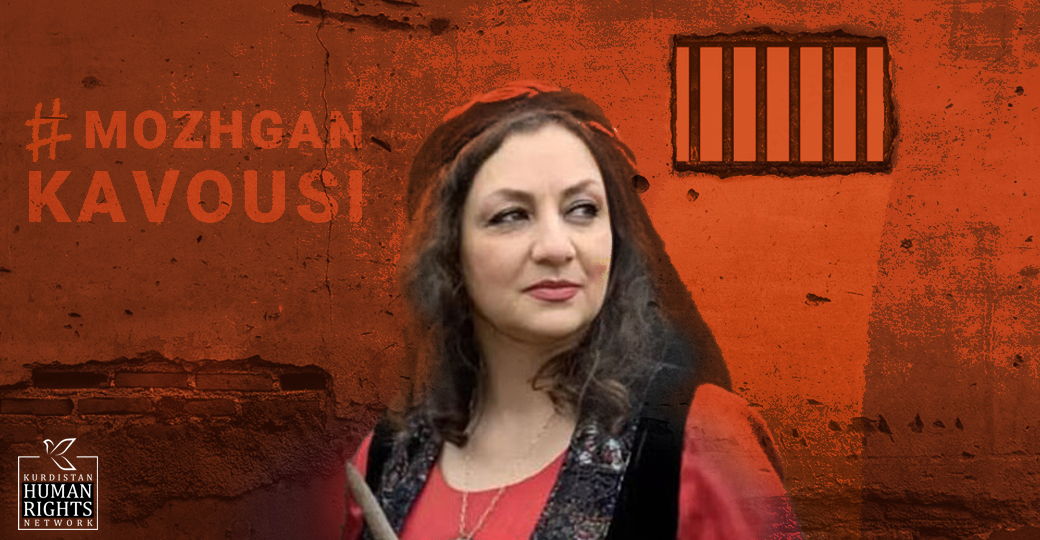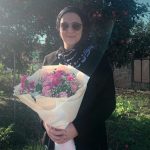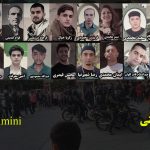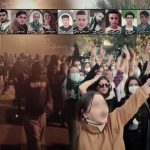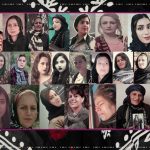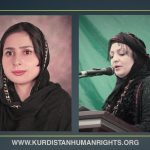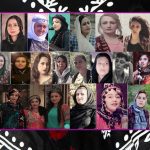Mozhgan Kavousi is a Yarsani Kurdish writer and researcher. Her translation of the book “Anfal and the Story of Timur, the Sole Survivor from the Mass Graves of Anfaled Women and Children” was published in 2019. She also directed the documentary film “Hiwa”.
She has been summoned, arrested, and imprisoned several times due to her activities.
On 18 November 2019, she was arrested by the Intelligence Organisation of the Islamic Revolutionary Guard Corps (IRGC) at her family home in Nowshahr and was released on bail after about a month.
On 19 May 2020, she was arrested in Nowshahr to serve a three-year prison sentence and was sent to the city’s prison. However, after a few days, she was transferred to the women’s ward of Evin Prison in Tehran.
On 6 October 2021, she was transferred from Evin Prison to the Police Detention Centre in Karaj, and after three days of harsh conditions, was moved to Kachouei Prison in Karaj. The Mazandaran Province Court of Appeals had previously ordered her transfer to one of the prisons in Alborz Province to serve the remainder of her sentence.
On 5 January 2022, she was released from Kachouei Prison in Karaj after 21 months of imprisonment.
Arrest
Kavousi was arrested at her family home in Nowshahr, Mazandaran Province, on 22 September 2022.
She was transferred to a security detention centre in Mazandaran Province and after 35 days, moved to Tonekabon Prison.
On 3 January 2023, she was released from Qaem Shahr Prison in Mazandaran Province on bail of 30 billion rials – nearly 60,000 USD.
Judicial Process
Her trial was held on 20 December 2023 in Branch One of the Islamic Revolutionary Court of Sari on charges of “spreading corruption on earth” (efsad-e fel arz), “insulting the leader”, “spreading falsehoods”, “propaganda against the state”, “incitement and provocation of people to war and murder with the intent of disrupting national security”, and “collaboration with hostile states”.
On 29 December 2023, her lawyers were informed of the verdict, according to which she was sentenced to 15 months and one day of imprisonment for “insulting the leader”, eight months of imprisonment for “propaganda against the state”, and 39 months of imprisonment for ” incitement and provocation of people to war and murder with the intent of disrupting national security “.
Based on Article 134 of the Islamic Penal Code, from the total of 59 months and one day of imprisonment, the severest punishment, which is 39 months of imprisonment, is enforceable.
A petition for retrial was accepted by Branch 39 of the Supreme Court on 22 June 2024, and the case was referred back to the equivalent court, Branch Two of the Islamic Revolutionary Court in Sari, for reconsideration.
On 11 August 2024, the court reduced the sentence to one year’s imprisonment.
Current Status
On 17 December 2024, Kavousi was summoned to the Sari Court’s Enforcement of Judgements Office and taken to Tonekabon Prison to serve her sentence.
She has been serving her sentence in open prison since 15 June 2024.
Notes:
1. Women, Life, Freedom Uprising: Jina Amini (Mahsa Amini), a 21-year-old Kurdish woman from Saqqez, Kurdistan Province, was arrested on a street in Tehran on 13 September 2022 by the morality police because of the way she was dressed. Shortly after her arrest, she was transferred to Kasra Hospital in Tehran with head injuries and symptoms of brain death, and passed away three days later on 16 September 2022. The government’s killing of Jina sparked unprecedented anti-government protests, which began with a large turnout at her funeral at Aichi Cemetery in Saqqez and quickly spread to many cities across Iran. These widespread protests against the Islamic Republic of Iran, which lasted for several months, resulted in at least 527 protesters being killed and thousands injured and arrested. The protests are known for their central slogan of “Women, Life, Freedom” (Kurdish: Jin, Jiyan, Azadi).
2. Article 286 of the Islamic Penal Code: “Anyone who extensively commits crimes against the physical integrity of individuals, crimes against the internal or external security of the country, dissemination of falsehoods, disruption of the country’s economic system, arson and destruction, distributing toxic, microbial, and dangerous substances, or establishing centres of corruption and prostitution or assisting in such activities, in a manner that causes severe disruption to public order, insecurity, or significant damage to the physical integrity of individuals or public and private property, or leads to widespread corruption or prostitution, shall be considered a corrupter on earth.”
3. Article 514 of the Islamic Penal Code (Deterrent Punishments and Penalties): “Anyone who insults the Founder of the Islamic Republic or the Leader in any manner shall be sentenced to imprisonment ranging from six months to two years.”
4. Article 698 of the Islamic Penal Code: “Anyone who, with the intent to harm another person, disturb public opinion, or mislead official authorities, makes false statements or attributes actions contrary to the truth, either directly or indirectly, to an individual or legal entity, whether in a letter, complaint, correspondence, petition, report, or by distributing any kind of printed or handwritten materials, whether signed or unsigned, shall be sentenced to imprisonment from two months to two years or up to 74 lashes, regardless of whether the falsehood causes material or non-material harm to others. In addition to these penalties, if possible, the person’s reputation must be restored.”
5. Article 500 of the Islamic Penal Code: “Anyone who engages in propaganda activities against the Islamic Republic of Iran or in favour of groups and organisations opposing the state, in any manner, shall be sentenced to imprisonment for a period of three months to one year.”
6. Article 512 of the Islamic Penal Code: “Anyone who, with the intent to disrupt national security, entices or incites people to engage in conflict and bloodshed among themselves, regardless of whether it leads to murder and plunder, shall be sentenced to one to five years’ imprisonment.”
7. Article 508 of the Islamic Penal Code: “Any individual or group who, in any manner, collaborates with hostile foreign states against the Islamic Republic of Iran, provided they are not deemed to be moharebs (enemies of God), shall be sentenced to one to 10 years’ imprisonment.”
8. Article 134 of the Islamic Penal Code: “In the case of multiple crimes, only the most severe punishment mentioned in the verdict is enforceable, and the other punishments are not considered unless the most severe punishment is reduced or converted for a legal reason, such as the private plaintiff’s withdrawal of his complaint, the annulment of the legal punishment, or the passage of time, in which case the next most severe punishment will be implemented.”
9. Open prison is a legal provision that allows a person sentenced to imprisonment to engage in business activities outside prison, subject to the provision of a surety. The person must report to the prison or the court at the times specified by the Prison Classification Council or the court to sign a document.

